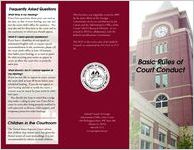Frequently Asked Questions
What time is my hearing? If you have questions about your case such as the time or date of your hearing, you can contact the court clerk's office for assistance. You may also ask for directions to the court and to the courtroom in which you should appear.
What if I need special assistance? If you have a disability, do not speak or understand English well, or require special accommodations in the courtroom, please call the court clerk's office at least 10 business days before your hearing, or as soon as possible after receiving your notice to appear in court, to allow the court time to properly assist you.
What should I do if I cannot appear at my hearing? If you are not able to appear in court, contact the court clerk at least 48 hours before your scheduled hearing. If you do not appear at your hearing and fail to notify the court, a warrant may be issued for your arrest in criminal cases.
You should also keep in mind that a judge may make a ruling in your case if you fail to come to court after being properly notified in civil cases such as divorce, child support, and temporary protective order hearings.
Children in the Courtroom
The United States Supreme Court advises that children may attend court, but given the formal nature of court proceedings, it is not recommended for infants or small children.
This brochure was originally created in 2005 by the joint efforts of the Georgia Commission on Access and Fairness in the Courts and the Administrative Office of the Courts' (AOC) Research Division. It was revised in 2013 in collaboration with the Judicial Qualifications Commission.
The AOC is the service arm of the Judicial Council, as authorized by O.C.G.A. 15-524.
Basic Rules of Court Conduct
Judicial Council of Georgia Administrative Office of the Courts 244 Washington Street, SW, Suite 300
Atlanta, Ga 30334 404-656-5171
www.georgiacourts.gov
Basic Rules of Court Conduct
I f you have been ordered to appear in court, this brochure will provide important information that will assist you before your appearance. This information does not constitute legal advice. If you require legal assistance, please consult an attorney. For more information about specific court policies, or if you have any questions that are not covered in this brochure, please contact your local court clerk's office.
When Appearing in Court
Be on time
Throw away gum, food, and drinks before entering the courtroom
Stand when the judge enters and leaves the courtroom
Stand when you are speaking to the judge
Speak clearly when you respond to the judge's questions
Always address the judge as "Your Honor"
Never interrupt the judge. If you are unsure of what you heard, wait until the judge or other person speaking has finished talking before asking a question
Enter and leave the courtroom quietly, so you do not disturb others
Only approach the bench when instructed to do so
Prohibited Items
Items that should NOT enter the courthouse: Weapons of any kind Electronic recording equipment such as video or
voice recorders, or cameras (unless approved by the court) Food, beverages, chewing gum, and tobacco
Security Precautions
Before entering the court you may go through a security checkpoint. In most cases, you will be asked to walk through a metal detector or an officer will use a wand to check for prohibited items. You should allow the officer to search any bags, packages or personal belongings that will be taken into the court. If you refuse to cooperate, you may be denied entry to the facility.
Cell Phones and Mobile Devices
The use of cell phones and other mobile devices may not be allowed in the courtroom. It is recommended that you call ahead to find out if these will be allowed in the courtroom. Your phone or device should be turned off or placed on silent mode before entering so that you do not disrupt the court. The court may instruct you on other issues of use in the courtroom.
Dressing for Court
If you are appearing in court you should dress nicely and in a manner that shows respect for the court.
Here are some things you should NOT wear:
Hats or other head coverings inside the courtroom (except those worn for religious or medical purposes)
Sunglasses
T-shirts depicting violence, sexual acts, profanity, or illegal drugs
Tube or halter tops/plunging necklines/ bare midriffs
Ripped or torn jeans
Miniskirts or shorts
Baggy pants that fall below the waist
Muscle shirts (usually worn as undergarments)
If you are not dressed properly, you may be asked to leave the court and return at a later date. This will delay your hearing and require you to appear in court more than once.
Respect
The courtroom is a place of order and structure. You should at all times act in a respectful manner when in the presence of the judge, court staff, attorneys, court officers and other persons attending court. Once the court has made a ruling in your case, continue to be respectful as you exit the courtroom. Attempts to disrupt the court once the judge has made a ruling could result in your being held in contempt (which could include jail time and/or a fine).
